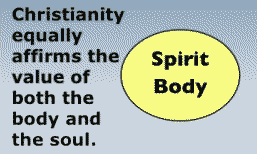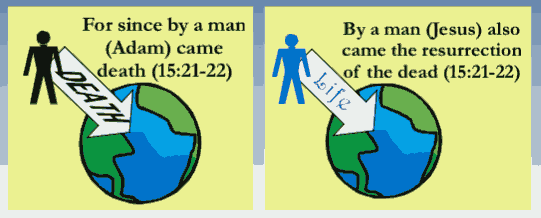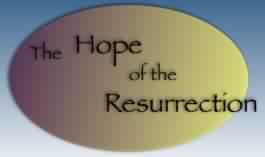
The Hope of the Resurrection
Defending the Resurrection
1 Corinthians 15:12-34
The Bible Teaching Commentary
Paul J. Bucknell
_________________________
Introduction of 1 Corinthians 15 |
Defending Resurrection (15:12-34)
Explaining the Resurrection (15:35-49) |
Proclaiming the Resurrection (15:50-58)
Bible Study Questions for 1 Corinthians 15:12-58
Purpose
Defending the Resurrection on 1 Corinthians 15:12-34 highlights Paul's three arguments defending the fact of the resurrection. This is a part of the larger series The Hope of the Resurrection on 1 Corinthians 15:12-58 which helps people understand, defend, explain and even proclaim the resurrection of Jesus Christ. Bible Study questions are provided.
Three Arguments for the Resurrection
Make sure you read the important introduction to 1 Corinthians 15!
Below are Paul's three arguments defending the resurrection.
-
1) Common Sense Argument (1 Corinthians 15:12-19)
-
2) The Order Argument (1 Corinthians 15:20-34)
-
3) Argument of Hope (1 Corinthians 15:29-33)
1) Common Sense Argument (1 Corinthians 15:12-19)
1 Corinthians 15:12-19
"Now if Christ is preached, that He has been raised from the dead, how do some among you say that there is no resurrection of the dead? 13 But if there is no resurrection of the dead, not even Christ has been raised; and if Christ has not been raised, then our preaching is vain, your faith also is vain. 1415 Moreover we are even found to be false witnesses of God, because we witnessed against God that He raised Christ, whom He did not raise, if in fact the dead are not raised.
16 For if the dead are not raised, not even Christ has been raised; and if Christ has not been raised, your faith is worthless; you are still in your sins. Then those also who have fallen asleep in Christ have perished. If we have hoped in Christ in this life only, we are of all men most to be pitied" (1 Corinthians 15:12-19).

Note their problem. “Some say there is no resurrection of the dead.”
Greek philosophy not only influenced Judaism but also Christianity. There are several extremes, which people allow to shape their Biblical perspectives. This affected Christians in the early church and still greatly affects us today.
1) Some deny the spirit and emphasize only the body and desires. Only willing to observe what one feels and can see (today’s modernism and materialism, science as its taught).
 2) Others deny the body or the value of the body and only believe in the supreme and pure soul or spirit (Platonism, Christian Science, Proper Hinduism and Buddhism, Gnosticism, New Age, etc.).
2) Others deny the body or the value of the body and only believe in the supreme and pure soul or spirit (Platonism, Christian Science, Proper Hinduism and Buddhism, Gnosticism, New Age, etc.).
We have noticed that each extreme causes an overreaction in the other extreme. The greatest problem is that Christians hold to such unsupported philosophies and do not realize it. They think what they believe is Christian without ever analyzing what they believe. Paul was helping them observe their worldview.
Shock them
Paul wants them to see what life would really be like with no resurrection. Those who hold to certain beliefs rarely are consistent in applying what they believe to their lives.
If the dead aren't raised, then Christ not raised.
Then our preaching is in vain
Then your faith is in vain.
Then apostles are false witnesses (15): Then they wrongly stated Christ rose.
If the dead aren't raised, then Christ is not raised (16)
Then your faith is worthless (still in your sins) (17)
Then those who have died perished (18)
Without Christ’s resurrection, our Christian faith is empty or void of effectiveness. Do you see how a worldly philosophy or presumption can erode one’s faith? They probably never denied Christ’s resurrection but only wondered about the resurrection of the dead. Paul corners them. Either they fully accept Christ’s resurrection that affirms the resurrection of the body or they deny Christ and His claims. There is no middle road.
He pointed out how critical Christian doctrines are founded on the resurrection of Jesus Christ. I believe that many Christians today likewise have swallowed a dose of this thinking. They say they believe but down deep they have questions. Some are not honest; others are not aware of the tension.
Unless you have been well trained in apologetics, then the educational system has likely neutered your faith. You are a spaded Christian. This is one clear reason that many Christians sit untouched. They don’t know the power of the resurrection and the reality of what it means to live with Jesus living and involved in our lives.
Paul had no problem pointing how crucial the bodily resurrection is to their Christian faith. Why? He saw Christ! He was transformed.
|
Some are not honest; others are not aware of the tension. Unless you have been well trained in apologetics, then the educational system has likely neutered your faith. You are a spaded Christian. This is one clear reason that many Christians sit untouched. They don’t know the power of the resurrection and the reality of what it means to live with Jesus living and involved in our lives.
Paul had no problem pointing how crucial the bodily resurrection is to their Christian faith. Why? He saw Christ! He was transformed.
The resurrection defends the importance of the body by the fact of its return appearance. We cannot dismiss the value of the body because of death. Something else is coming. Christ proved this by His resurrection.
Then our preaching is in vain (15:14) |
Then your faith is in vain (15:14) |
Then we (apostles) are false witnesses (15:15) |
Then your faith is worthless (still in your sins) (15:17) |
Then those who have died perished (15:18) |
2. The Order Argument (1 Cor 15:20-34)
The argument is simple. With the knowledge of the scriptures, we know the origin of death. Adam sinned and therefore all his descendants got this malignant spiritual disease called death. We see how one person affected the human race.
Jesus Christ came and likewise affected the human race—He died for the sinful; He died for His people’s sins, but Jesus also came alive. Many witnessed how He was resurrected. The part that we are still waiting for is for those who are connected to Christ through faith to be raised with a glorious body. Of course, this hasn’t happened yet. We haven’t first died!
• Christ is the first fruits
• Christians will follow Christ

Paul presents three time patterns.
They are all the same in that one precedes the other. We are to learn from what has occurred so that we will better understand what will happen. History is repetitive, not perfectly in detail but in pattern.
1) Order of Allegiance: Death > Life (1 Cor 15:22)
"For as in Adam all die, so also in Christ all shall be made alive" (1 Cor 15:22)
2) Order of Timing: Christ first raised then the Christians (1 Cor 15:23)
"But each in his own order: Christ the first fruits, after that those who are Christ’s at His coming" (1 Cor 15:23)
3) Order of Purpose: Death reigns > Christ reigns (1 Cor 15:24-28)
"Then comes the end, when He delivers up the kingdom to the God and Father, when He has abolished all rule and all authority and power" (1 Cor 15:24)
Christ subdues all things shown by subduing death (Death conquered all before Him)
But then (28) all things including the Son Himself will be subjected to the One who subjected all things to Him.
"And when all things are subjected to Him, then the Son Himself also will be subjected to the One who subjected all things to Him, that God may be all in all" (1 Cor 15:28).
People are rather forced to deny the resurrection of Christ. After all, if Christ is alive, then they are accountable to Him, becoming a very uncomfortable position. Because of this, Paul then plunges into some arguments that prove the resurrection. He argues a bit differently than we are used to, but it is thoroughly logical and consistent.
3. Argument of Hope (1 Cor 15:29-33)
Baptism for the Dead
Paul continues his defense of the resurrection in a very practical way. Let’s listen to him in 1 Corinthians 15:29-33.
"Otherwise, what will those do who are baptized for the dead? If the dead are not raised at all, why then are they baptized for them? 30 Why are we also in danger every hour? I protest, brethren, by the boasting in you, which I have in Christ Jesus our Lord, I die daily. If from human motives I fought with wild beasts at Ephesus, what does it profit me? If the dead are not raised, LET US EAT AND DRINK, FOR TOMORROW WE DIE. Do not be deceived: “Bad company corrupts good morals.” Become sober-minded as you ought, and stop sinning; for some have no knowledge of God. I speak this to your shame" (1 Cor 15:29-34).
Some people get thrown off by 15:29 and make a whole set of doctrines from it. The verse is one of the most vague verses we have in the scriptures. 'Baptism for the dead’ is nowhere else mentioned in the scriptures. Baptism is always for the living.
Some people get thrown off by 15:29 and make a whole set of doctrines from it. The verse is one of the most vague verses we have in the scriptures. We only know that this “baptism for the dead” is nowhere else mentioned in the scriptures. Baptism is always for the living. Perhaps Paul is referring to the baptism of a recent professing Christian who did not have the opportunity to be baptized due to some extreme form of persecution, which brought about his death.
Or perhaps it refers to some odd ceremony by others in Corinth, maybe not even Christians. Karma, too, speaks of future life but only in light of judgment so though the hope is there, like hell, it tapers the desire for living on by the threat of judgment. In the latter case, Paul would not be supporting this issue but just only using it to showcase mankind’s hope of the resurrection.
We sometimes refer to the Egyptians hope for the future by pointing to the Pharaoh's elaborate preparations for the life hereafter in the pyramids.
“If from human motives I fought with wild beasts at Ephesus, what does it profit me if the dead are not raised” (1 Corinthians 15:32).
Watch your friend’s beliefs! 15:33-34
"Do not be deceived: “Bad company corrupts good morals. Become sober-minded as you ought, and stop sinning; for some have no knowledge of God. I speak this to your shame"" (1 Corinthians 15:33-34).
In verses 33-34 Paul simply tells them that they have picked up these false doctrines from those around them. They need to avoid such people. “Bad company corrupts good morals.” Every doctrine or teaching has its impact on people’s lives. If we do not live in the power of the resurrection, then we will focus on pleasing our own desires.
They are to be sober-minded and stop sinning. There are people around us that do not know God and therefore do not accept what God has said about certain things including the resurrection of the body. Belief in the physical resurrection of the body is a crucial doctrine. We should not take a person’s view of this doctrine lightly. If we were to leave this area and find another church elsewhere, this teaching of Christ’s physical resurrection is most important because it affects our whole approach to life.
In essence, it comes down to, either I will live for this world or for the next. The resurrection of the body allows for the judgment and reward, hell and heaven. Without it, they both do not exist. In fact, to the degree this teaching is clear in our hearts and minds, our purpose in life is shaped. We are willing to give up things easier. Have you ever sensed that God wanted you to give up something? Maybe it was bad, maybe it wasn’t. You try and try but fail. The reason is that your heart is not sufficiently set on the world to come. The teaching of the resurrection of the body is not clear.
Think of the early church. Having seen Jesus’ resurrected body, they were challenged by His words. They totally lost the present world’s hold on their lives. They knew Jesus’ wishes were everything with them. The life of the church is greatly centered on our belief in the resurrection.
If Jesus would reveal Himself to us today, would it make a difference in how you respond to Him? It did to Saul who became Paul; murderer to evangelist. Jesus is here anticipating our use of faith to respond to Him even though we do not see Him. Peter says,
“And though you have not seen Him, you love Him, and though you do not see Him now, but believe in Him, you greatly rejoice with joy inexpressible and full of glory.” (1 Peter 1:8).
Note how Peter over and over again refers to how his own life is affected by the resurrection. His life purpose is now oriented around the hope of the resurrection. It so deeply affects everything that Paul stated that if the resurrection of the body is not real, he is the biggest fool in the world. Why else would he fight wild beasts? Why would he be in danger “every hour?” Why else would he “die to himself daily?” He daily tames his body so that it enables him to fully serve God and others.
A prayer
“Dear Father, How precious is Your Name, Your will! Lord, I have often gone astray seeking my way, my time, my preferences. Please forgive me for hindering your purposes through my life in Christ’s name. I don’t want to live by my own strength or even for my own purposes. My will is to do your will. My heart is to please You alone. I die to myself and present myself alive to do your will as you please. Only empower me with your love and power that I might minister to others around me as Christ would. In Christ’s Name I pray, Amen.”
=> For the second argument for the resurrection Explaining the Resurrection (15:35-49)
 Most of BFF articles such as this one is nicely formatted for printing. This article also has a Powerpoint. Check out the great number of articles on the BFF Biblical Training Libraries all for one low cost. Most of BFF articles such as this one is nicely formatted for printing. This article also has a Powerpoint. Check out the great number of articles on the BFF Biblical Training Libraries all for one low cost. |
info@foundationsforfreedom.net
Scriptures typically quoted from the New American Standard Bible unless noted:
(C) Copyright The Lockman Foundation 1988











